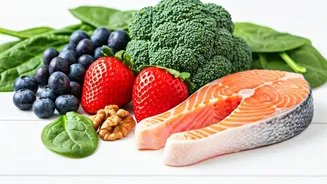Fueling Young Minds
The early years of a child's life are crucial for brain development. What children eat significantly impacts their cognitive function, memory, and overall
well-being. A diet rich in specific nutrients can boost brainpower and set the stage for academic success and emotional intelligence. Many parents may not realize the foods they choose can have a huge impact on their children. Certain foods offer essential building blocks for a healthy, functioning brain. Making informed food choices can give your child an advantage in terms of learning, focus, and overall mental health. A balanced diet filled with brain-boosting nutrients is a gift that keeps on giving, and sets children up for a lifetime of cognitive vitality. Prioritizing brain-healthy foods from a young age is a proactive approach to nurturing your child's potential.
Power of Fatty Fish
Fatty fish, such as salmon, are packed with omega-3 fatty acids, which are critical for brain health. Omega-3s contribute to the structure of brain cells and are vital for cognitive function. Consuming fish provides essential fatty acids, and improves memory and overall brain performance in children. To incorporate fish into your child's diet, try baking salmon with herbs, serving tuna sandwiches, or adding fish to salads. It's important to choose sustainably sourced fish. If your child dislikes fish, you can consider an omega-3 supplement after consulting with a pediatrician. Ensuring your child gets enough omega-3s is a cornerstone of brain-boosting nutrition, supporting cognitive function and overall well-being.
Eggs and Nutrients
Eggs are a fantastic source of protein and nutrients that support brain health, including choline, which is essential for memory. Eggs are a versatile food that can be prepared in various ways. Scrambled eggs, omelets, and hard-boiled eggs are easy and appealing options for kids. Choline deficiency can impair memory and cognitive function, making eggs a must-have in a child's diet. The nutrients in eggs also contribute to focus and concentration. When introducing eggs to your child, consider how they will be prepared, and offer a variety to avoid monotony. Eggs, therefore, are a valuable component of a brain-healthy diet. Remember to consult with a pediatrician about dietary allergies, and introduce them accordingly.
Berries for Brains
Berries, such as blueberries and strawberries, contain antioxidants that protect brain cells from damage. Antioxidants help fight free radicals, which can harm brain cells. These berries can also improve communication between brain cells. Adding berries to your child's diet is easy and delicious. They can be added to breakfast cereal, yogurt, smoothies, or eaten as a snack. Opt for fresh berries when in season, or use frozen berries for convenience. Berries not only offer brain benefits but also contribute to overall health. Their natural sweetness makes them a great alternative to processed snacks. Berries offer a powerful combination of antioxidants and cognitive benefits, contributing to long-term brain health and function.
Oats and Whole Grains
Whole grains, such as oatmeal and whole-wheat bread, provide the brain with a steady supply of energy in the form of glucose. This stable energy level is essential for focus and concentration. Oatmeal is a great choice. The complex carbohydrates in oats are digested slowly, providing sustained energy. Whole grains also contain fiber, which helps regulate blood sugar levels, preventing energy crashes. This can help children stay alert throughout the day. To incorporate more whole grains into your child's diet, consider using whole-wheat bread for sandwiches, or serving brown rice instead of white rice. The sustained energy provided by whole grains supports the brain's need for a consistent fuel supply, which is critical for learning and concentration.
















